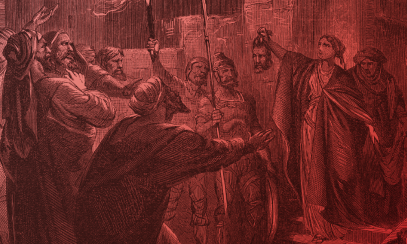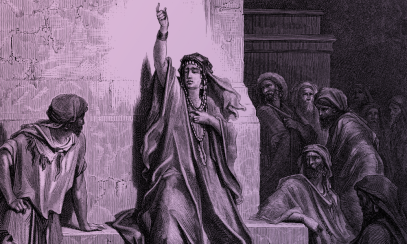Why Does God Remain Hidden?
Why does God remain hidden? For the believer, this question can challenge faith itself. For the non-believer, the question alone can be sufficient to prove the non-existence of God. So how can we begin to approach it in a way that can both deepen our own faith and help us respond to those who do not believe?
It’s for our own good
One of the attributes of God the Father is that of omnipotence. We can read in the Old Testament how the prophets often approached the Divine with fear and trembling in deference to this power. In fact, so great is the power of the Father that when Moses asked to see the Lord’s glory, God answered, "I will make all my beauty pass before you. ... But my face you cannot see, for no one sees me and still lives" (Ex 33:19-20).
From this we might infer that, in order for us to exist at all, the Father must withhold or protect us from the sheer power of his Being -- otherwise, we, too, would be completely consumed.
Above our pay grade
God’s hiddenness might also simply be due to God’s utter transcendence. God is an inexhaustible mystery. St. Augustine aptly put it this way: if you think you understand God, then what you think you understand is not God. In a like manner, Pope Francis teaches that even the desire to see God can be dangerous spiritually if that desire is not properly ordered. He states the “risk in seeking and finding God in all things, then, is the willingness to explain too much, to say with human certainty and arrogance: ‘God is here.’”
Sunshine on my shoulders
However, the Church has been clear that, while ultimately transcendent and “hidden,” God can be known, although never with complete certainty. The Danish theologian, Soren Kierkegaard (1813-55), is helpful here. He asks us to imagine a bright sunny day. Everything is vibrant and alive. All the illumined world is a delight to the eyes and the warmth of the sun is a comfort to the body and soul. He suggests that our experience of all this makes known to us the existence and nature of the source. However, if we decide we turn toward the sun to “see” the cause of all this light and warmth, we will be blinded.
In the same way, we can see evidence of God in all that exists. We can know something of the Creator through creation. Yet, we are not able to grasp God directly through our sight.
What’s love got to do with it?
God’s apparent hiddenness might also have everything to do with God’s plan for us – eternal life in communion with the Blessed Trinity. So what does it mean to be in communion with God?
We have already seen that the Father constrains rather than asserts his power in order that there might be life. We also know that the Son “emptied himself, taking the form of a slave … he humbled himself, becoming obedient to death, even death on a cross” (Phil 2:6-8) so that there might not only be life, but life to the full. What’s more, the Holy Spirit emptied himself as well by taking up residence within each one of us so that we may actually live in the communion planned for us.
All this is to say that, if we are to be in communion with God, we, too, must empty ourselves in self-giving love. And this is precisely what the two great commandments help us do.
Notice that the love of self is assumed by these commandments. This desire to seek out our greatest good is a God-given gift – for to be driven toward our greatest good is to be driven to God. So the most “selfish” thing we can do is to obey the first great commandment by loving God with all our heart, with all our soul and with all our mind – for communion with God is our greatest good.
The second great commandment then orders the love of self by teaching us that proper self-love consists in loving our neighbor precisely in the same way and to the same degree we love ourselves. In other words, we all want, or should want, the greatest good for ourselves so to love our neighbor in the same way necessarily means we must want the greatest good for our neighbor. Why? We can only love the God we cannot see (our greatest good) by loving the neighbor we can see.
It’s up to you
So we see that charity is, in fact, not self-seeking, “a sinking in the intoxication of happiness; instead it seeks the good of the beloved: it becomes renunciation and it is ready, and even willing, for sacrifice” as Pope Emeritus Benedict XVI writes. And so we find ourselves face to face with the wondrous mystery and tension that is the Catholic faith. It is a faith that teaches us the road to the kingdom of heaven is traversed not by grasping, but only by kenosis (self-emptying). It is a faith that tells us the most “selfish” thing we can possibly do is to forget ourselves and get busy loving our neighbor.
This means, oddly enough, that the hiddenness of God is determined in large measure by the lives of the faithful. Those of us who call ourselves Christians are always and everywhere making Christ, and therefore God, visible or invisible in the world through our words and deeds.
FOR FURTHER REFLECTION
Consider prayerfully reading the following Scripture passage:
And about three o’clock Jesus cried out in a loud voice, “Eli, Eli, lema sabachthani?” which means, “My God, my God, why have you forsaken me?” Some of the bystanders who heard it said, “This one is calling for Elijah.” Immediately one of them ran to get a sponge; he soaked it in wine, and putting it on a reed, gave it to him to drink. But the rest said, “Wait, let us see if Elijah comes to save him.” But Jesus cried out again in a loud voice, and gave up his spirit.
- Matthew 27:46-50
Reflection Questions:
1. Reflect for a few moments on this passage. How does Jesus’ question to God and the subsequent silence from God make you feel?
2. What does this passage have to say about the hiddenness of God and the proper response to it?
3. How can this passage help you discuss the hiddenness of God with a non-believer?



